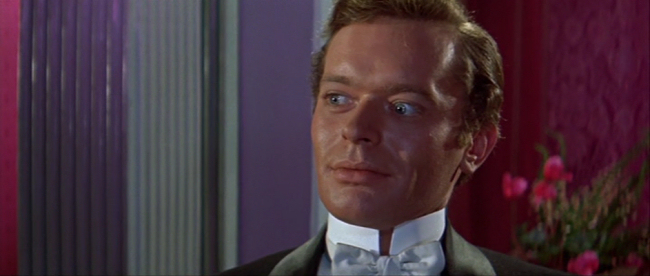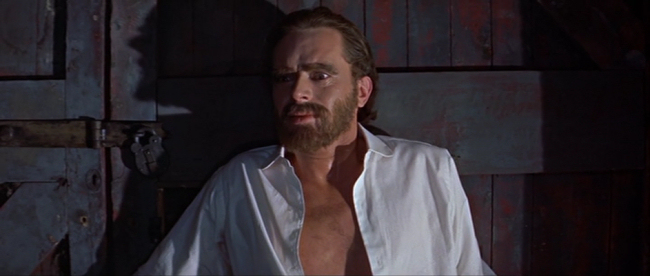
Working from a philosophical perspective directly opposite to the source novella's, Hammer's 1960 film The Two Faces of Dr. Jekyll drastically reworks the premise of the original story. Instead of a Jekyll seeking to morally purify himself, this film's doctor subscribes to the 19th century intellectual fascination with amorality. His Hyde is just as different--instead of a small, uncouth cretin, we see a cool and refined gentleman who unabashedly exercises the license of his class in the mould of Dorian Gray. The film presents this philosophy of morals in order to ultimately condemn it--it's a stimulating idea though the film doesn't quite manage to support its position. But it has a nice cast in Paul Massie, Dawn Addams, and Christopher Lee and has that lovely lurid cinematography one associates with Hammer.

Instead of a Jekyll frustrated by a long delayed marriage, Paul Massie plays a Jekyll who's been married a long time, and has long ceased to care. He lives essentially alone in his laboratory without family or even servants (the film is set in 1874 for some reason, more than a decade before the original novella was published). His neglected wife, Kitty--yes, Kitty--played by the beautiful Dawn Addams lives alone in their lavish manor. The two hardly talk except when Kitty comes over to borrow money for Jekyll's old friend, Paul Allen--Christopher Lee in yet another role that shows his underrated versatility.

A scoundrel who leans on the distracted Jekyll to pay his gambling debts, Paul is also sleeping with Kitty, something Hyde soon discovers, much to his amusement. It's hard to say how much Jekyll even cares about it--in his first scene, Jekyll lays out his philosophy for his friend and colleague, Dr. Littauer (David Kossoff).
JEKYLL: "Good","evil". This moral quibbling is useless. Man as he is comprises two beings. One whom I call "man as he could be". It is perfection. This inner man is beyond good and evil.
LITTAUER: And the other man?
JEKYLL: He too is beyond good and evil. "Man as he would be". Free of all the restrictions society imposes upon us. Subject only to his own will.
LITTAUER: A very dangerous man, my friend. For what civilises us other than these moral restrictions of which you make so little?

And of course the rest of the movie goes about proving Littauer right--it sounds fun to say people should have the right to follow their every impulse but in practice it eventually ends up a mess for everyone. Sooner or later assertions of absolute liberty mean infringing on the rights of others. But director Terence Fisher and screenwriter Wolf Mankowitz have their sights set on something bigger than saying civilisation is a good idea.

Beyond Good and Evil is the title of a famous work by Friedrich Nietzsche and in this work Nietzsche demonstrates how he is very much in tune with the ideal of the Romanticists concerning people who surpass the boundaries of conventional morality--Nietzsche was a great admirer of Lord Byron's Manfred. But to say that Nietzsche was advocating a society where the weak are preyed upon by the strong is a typical misunderstanding of his ideas. Nietzsche was criticising morality as an intellectual shortcut that allowed people to justify things on abstract concepts of good and evil--as such, Robert Louis Stevenson's Strange Case of Dr. Jekyll and Mr. Hyde is very much in harmony with Nietzsche in that it is Jekyll's belief in an erroneous idea of moral purity that leads to the creation of Hyde and Jekyll's destruction.

In Fisher's film, Jekyll is an intellectual stuck in his lab, cut off in his reality, and his comeuppance comes when his ideas of amorality, attractive and fascinating in private, become ridiculously impractical and dangerous when put into practice by Hyde. Hyde might decide he's going to take advantage of a seemingly naive young woman, but in the universe without morality there's nothing stopping this young woman from being part of a gang of thieves who have just as much right knock Hyde over the head and take his wallet as he has to abuse the trust of a young woman. Yes, this is a Jekyll and Hyde where Hyde gets mugged.

There is a surprisingly feminist reading one could have of this film. Why shouldn't Kitty be sleeping with Paul? She has a right to be happy and she's obviously not getting any from Jekyll. Hyde's fury when he can't divert her affections from Paul just because Hyde wants to take advantage of her is another demonstration of the limits of Hyde's supposed freedom. Hyde and Kitty have some dialogue where they directly talk about conventional morality. Fisher and Mankowitz might have thought they were showing how it's important to have the institution of marriage to keep women from straying but the effect of the film is to show that, really, Kitty ought to ignore the institution and get as far from Jekyll as possible, though maybe Paul Allen isn't the best alternative.

It took me a minute to remember where I'd heard the name "Paul Allen" before--finally I realised it's the name of Jared Leto's character in Mary Harron and Guinevere Turner's film adaptation of American Psycho. The character's name is Paul Owen in the book--I wonder if they changed his name to Paul Allen as a reference to The Two Faces of Dr. Jekyll. It's probably just a coincidence but the blonde, wealthy, attractive, and slightly stupid Hyde in the Hammer film is really not so unlike Patrick Bateman.

It's entertaining watching Christopher Lee as the degenerate Paul Allen, not managing to come up to Hyde's level of shallowness.
The effects in the film aren't especially amazing--it's Jekyll who gets the makeup in this version, though it amounts basically to some really fake looking facial hair, but it's enough to make me believe people don't recognise Jekyll and Hyde as the same person. There's also an enjoyable dance sequence in the film where a woman (Norma Marla) puts a snake's head in her mouth. You don't need to be Freud to interpret that.


No comments:
Post a Comment